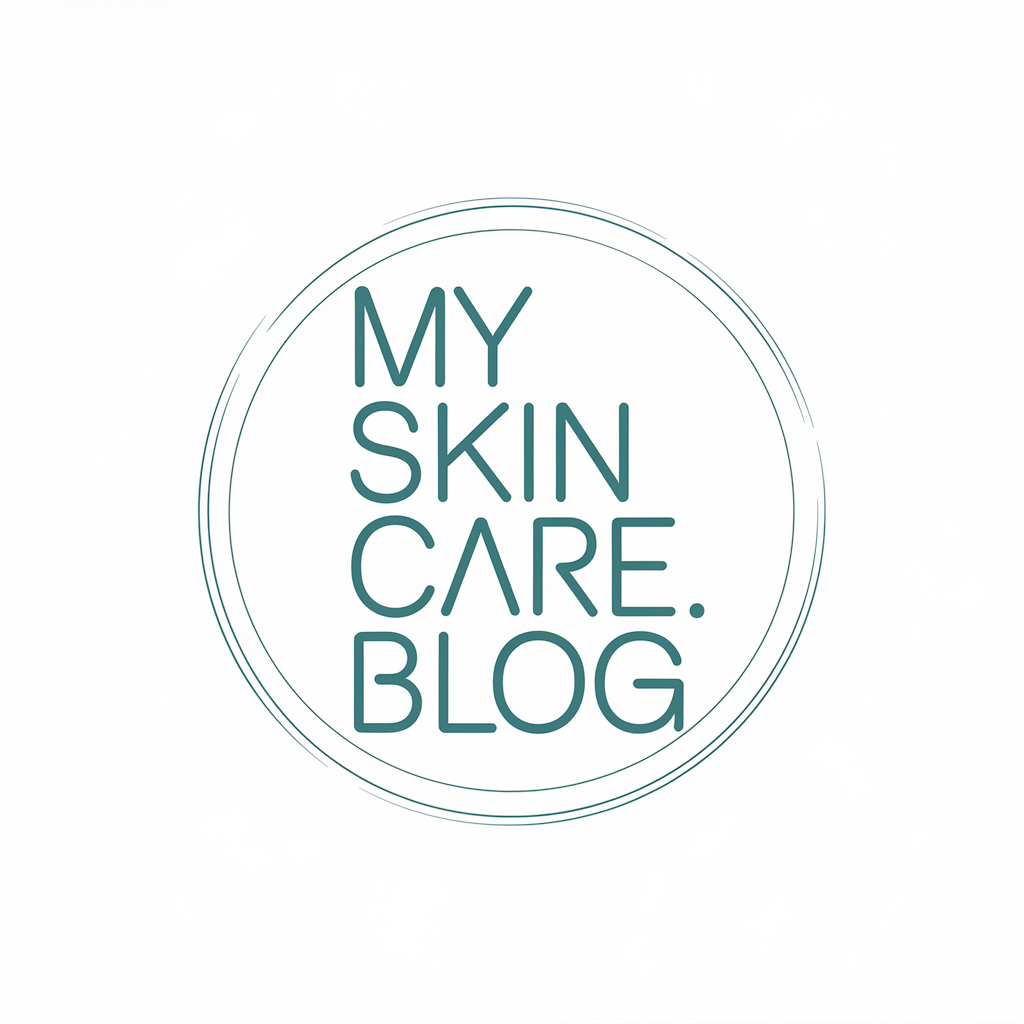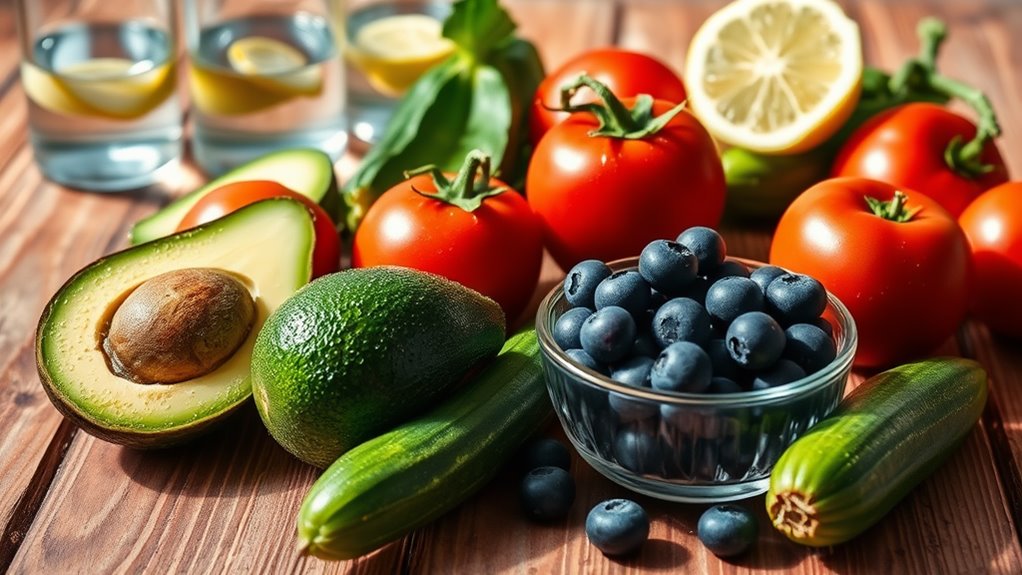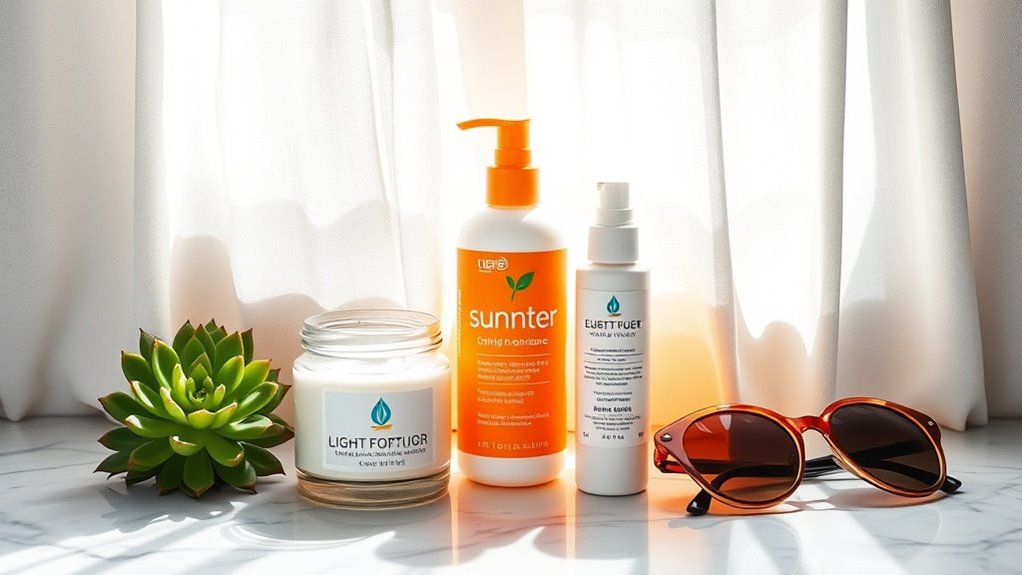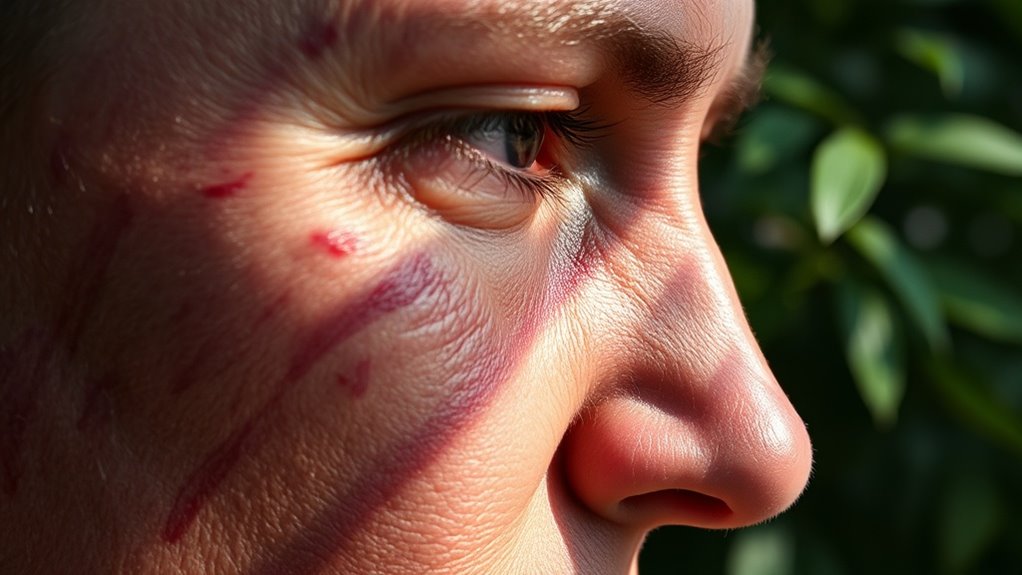Eat This, Not That- Clearer Skin Starts in Your Kitchen
What if the secret to clearer skin lies in your kitchen? By making simple swaps in your diet, you can greatly improve your skin’s health and appearance. Incorporating antioxidant-rich foods and healthy fats can combat inflammation and hydrate your skin. On the flip side, certain sugary snacks and dairy might contribute to breakouts. Curious about which specific foods can transform your complexion? Let’s explore the best choices for radiant skin.
Key Takeaways
- Eat antioxidant-rich foods like berries and leafy greens to combat oxidative stress and reduce inflammation for clearer skin.
- Choose hydrating fruits such as cucumbers and watermelons to boost skin moisture and flush out toxins.
- Incorporate healthy fats from avocados, walnuts, and fatty fish to enhance skin hydration and protect against oxidative stress.
- Avoid refined sugars and unhealthy fats found in candy bars and pastries that can aggravate acne and dull skin.
- Limit dairy intake, as it may trigger breakouts by increasing oil production and inflammation in some individuals.
The Role of Nutrition in Skin Health
Nutrition plays a vital role in maintaining healthy skin.
A balanced diet for skin is essential, as it provides the vitamins and minerals necessary for ideal function.
Incorporate foods rich in antioxidants, like berries and leafy greens, to combat oxidative stress.
Omega-3 fatty acids found in fish and walnuts can reduce inflammation, promoting a clearer complexion.
Don’t forget vitamin C from citrus fruits, which aids collagen production for skin elasticity.
Limit processed sugars and unhealthy fats, as they can trigger breakouts.
Moreover, dietary changes can lead to significant improvements in skin health over time.
Hydrating Foods for Glowing Skin
To achieve that radiant glow, incorporating hydrating foods into your diet is just as important as focusing on nutrition.
These foods not only keep your skin moisturized but also help improve its elasticity and texture.
Here are three hydrating options to include:
- Cucumbers – With 95% water content, they refresh your skin and provide essential nutrients.
- Watermelon – Packed with vitamins A and C, this juicy fruit helps boost hydration and combats dryness.
- Oranges – Rich in vitamin C and water, they keep your skin plump and radiant.
Additionally, collagen production is supported by these nutrient-rich foods, which can further enhance your skin’s appearance.
Add these foods to your meals for healthier, glowing skin!
Antioxidant-Rich Choices to Fight Acne
Incorporating antioxidant-rich foods into your diet can greatly help fight acne and enhance your skin’s overall health. Foods high in vitamin C, like citrus fruits and berries, not only boost your skin’s resilience but also promote hydration. Additionally, vitamin C is known for its ability to treat hyperpigmentation and achieve a more even skin tone.
Top Antioxidant Foods
A variety of antioxidant-rich foods can greatly boost your skin’s health and help fight acne.
Incorporating these foods into your diet can reduce inflammation and promote clearer skin.
Here are three top choices to try:
- Berries: Packed with vitamins and antioxidants, berries like blueberries and strawberries help combat oxidative stress.
- Dark Chocolate: Rich in flavonoids, dark chocolate can improve skin hydration and texture while reducing acne-causing inflammation.
- Spinach: Loaded with vitamins A, C, and E, spinach nourishes your skin and helps fight free radicals.
Add these foods to your meals for healthier, clearer skin!
Benefits of Vitamin C
Vitamin C is a powerhouse nutrient that can greatly enhance your skin’s health and combat acne. This antioxidant helps to neutralize free radicals, reducing inflammation and promoting healing.
Incorporating vitamin C-rich foods like oranges, strawberries, and bell peppers can improve collagen production, leading to firmer skin and reducing acne scars.
Research shows that topical vitamin C can also inhibit sebum production, helping to prevent breakouts.
By choosing these antioxidant-rich options, you not only nourish your skin but also bolster your immune system.
Hydration and Skin Health
While vitamin C plays an essential role in skin health, hydration is equally important for maintaining a clear complexion.
Keeping your skin properly hydrated helps flush out toxins and reduces acne flare-ups.
Here are three antioxidant-rich choices to boost hydration and fight acne:
- Cucumbers – Packed with water and silica, they help retain skin moisture.
- Watermelon – Its high water content and vitamins A and C promote skin healing.
- Green tea – Rich in antioxidants, it combats inflammation and hydrates your skin.
Incorporating these foods into your diet can greatly enhance your skin’s clarity and overall health.
Healthy Fats That Nourish Your Skin
Incorporating healthy fats into your diet can greatly enhance your skin’s appearance. Omega-3 fatty acids, found in fish and flaxseeds, help reduce inflammation and promote hydration, while avocados provide essential nutrients that keep your skin supple. Additionally, avocados are rich in vitamins E and C, which are crucial for maintaining healthy and radiant skin.
Omega-3 Fatty Acids
Omega-3 fatty acids are essential for maintaining healthy skin, offering a range of benefits that can help combat dryness, inflammation, and even acne.
Incorporating these healthy fats into your diet can greatly improve your skin’s appearance. Here are three excellent sources of omega-3s you should consider:
- Fatty fish: Salmon, mackerel, and sardines are rich in omega-3s and provide anti-inflammatory properties.
- Flaxseeds: Ground flaxseeds are a plant-based source that can enhance skin hydration.
- Walnuts: These nuts not only offer omega-3s but also antioxidants that promote skin health.
Adding these to your meals can make a noticeable difference!
Avocado Benefits for Skin
Have you ever wondered how avocados can transform your skin?
Packed with healthy fats, avocados nourish and hydrate, keeping your skin plump and radiant. They’re rich in vitamins E and C, which help protect against oxidative stress and promote collagen production. This can minimize fine lines and improve elasticity.
The fatty acids in avocados also support the skin barrier, preventing moisture loss and reducing dryness.
Incorporating them into your diet not only enhances your skin’s glow but can also calm inflammation.
Try adding avocado to your salads, smoothies, or toast for a delicious boost to your skincare routine!
Sugary Snacks to Avoid for Clearer Complexion
To achieve a clearer complexion, steering clear of sugary snacks is essential. Excess sugar can spike insulin levels, leading to inflammation and breakouts.
Here are three sugary snacks you should avoid:
- Candy Bars: Loaded with refined sugars and unhealthy fats, they can aggravate your skin.
- Sweetened Yogurt: Often packed with hidden sugars, these can disrupt your gut health and reflect on your skin.
- Pastries: These often contain both sugar and white flour, contributing to acne and dullness.
Opting for healthier snacks can help maintain your skin’s brightness and clarity. Furthermore, dietary choices play a significant role in overall skin health. Replace them with fruits or nuts for better results!
Best Protein Sources for Skin Repair
Incorporating high-quality protein sources into your diet can greatly aid in skin repair and rejuvenation.
Foods rich in protein, like lean meats, fish, eggs, and legumes, provide essential amino acids that your body needs to produce collagen and elastin, key components for skin elasticity and firmness.
Additionally, nuts and seeds offer both protein and healthy fats, promoting hydration and reducing inflammation.
Opting for plant-based proteins, such as quinoa and chickpeas, can also support skin health without the saturated fats found in some animal products.
Prioritizing these protein sources can enhance your skin’s resilience and overall appearance. Moreover, a diet low in saturated fats can help prevent skin issues and promote a clearer complexion.
The Impact of Dairy on Your Skin
How does dairy affect your skin?
Consuming dairy may lead to breakouts for some people due to its influence on insulin levels and hormones.
Here are three key points to keep in mind:
- Hormonal Fluctuations: Dairy can increase insulin and IGF-1 levels, which may trigger oil production and acne.
- Inflammation: Some dairy products can cause inflammation, worsening existing skin conditions like eczema or rosacea.
- Individual Sensitivity: Everyone reacts differently; if you notice skin issues, try eliminating dairy for a few weeks to assess your skin’s response.
Additionally, everyday habits like touching your face or using dirty makeup brushes can exacerbate the effects of dairy on your skin.
Be mindful of your dairy intake for clearer, healthier skin!





